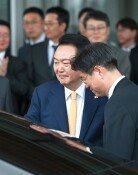[Editorial] Tackling the Water Shortage
[Editorial] Tackling the Water Shortage
Posted February. 12, 2009 07:48,
A water dispute between a metropolitan and a provincial government looks quite serious. Busan and South Gyeongsang Province are at odds over water at Namgang Dam in the province. North Jeolla Province, the city of Daejeon, and South Chungcheong Province are also feuding over the use of water at Yongdam Dam. A study said 52 disputes have erupted since 1999 due to aggravating pollution at major rivers and shortage of drinking water resulting from increased water use. Korea needs a fundamental solution to this problem, not to mention an immediate settlement of disputes.
A global emergency has erupted with countries scrambling to secure water. Water disputes are intensifying between Turkey and Syria; Angola and Namibia; Ethiopia and Egypt; China and India; and Jordan and Israel. Water shortages and the resulting shrinking of farm land are the main cause for the tragedy in Darfur, southern Sudan, where massacres have been committed. The United Nations predicts that seven billion people in 60 countries will suffer from lack of water in the middle of this century. Disputes over water resources entail a huge risk and are potentially as serious as terrorism and energy shortages.
According to a survey by the Korean Construction and Transportation Ministry in 2006, the average usable water per household in Korea is 1,512 cubic meters. If the figure in a country falls between 1,000 and 1,700 cubic meters, the country is considered to have a short supply of water. Korea uses only 27 percent of its annual precipitation, but its people waste water for drinking, washing and cooking just as much as their counterparts in advanced countries do.
The scarcer the water supply, the more frequent disputes between provincial governments will become. The serious drought this winter season could further fuel such disputes. Korea must enact basic water laws and establish an organization to comprehensively manage water resources if necessary. For the country to come up with legal and institutional measures for this, the central and provincial governments must work together.
Ultimately, Korea must increase its supply of clean water. About two thirds of annual precipitation comes in summer. So the country must urgently increase its capacity to collect and store seasonal precipitation rather than let it flow again. The government must actively consider building dams that can help store water. While carefully examining the impact of dams on the environment, the government should not be swayed by the argument objectively lacking logic and wasting time. Improving water quality through a new state project designed to streamline the four major rivers will be helpful toward this effort. The people should also recognize the severity of the water shortage and strive to save water in their daily lives.







